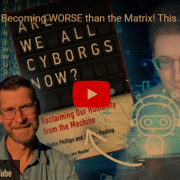Mark your calendars, because I will be presenting at the 2023 Digital Catacombs conference in Denver Colorado, June 7 – 9. Other speakers include Rev. Dr. Adam Koontz, Rev. Dr. Michael Brown, Rev. Brian Flamme, etc. You can view the conference schedule and purchase tickets here.
I will be talking about artificial intelligence and hoping to reframe a discussion that is in serious danger of getting off track. The Christian response to AI seems to be paradigmatic of a larger problem in how Christians typically respond to new technologies. Predictably, the discourse on technology tends to fracture into two groups.
- Those who feel the technology (whatever it may be) is not only non-neutral, but is demonic and should be entirely rejected, and who even eschew the process of thinking critically about it to take a “just say no” approach.
- Those who feel the technology, whatever it might be, is merely a neutral tool that we can leverage.
Caught in the pincer movement of these two extremes it’s easy for the church to become divided between a naïve optimism vs. an uncritical rejection. But although these extremes may seem like polar opposites, I will be arguing that they are actually two sides of the same coin. The alternative to both is to think critically about the new technology, and to reflect on how our tools change how we relate to the world and each other.
Thinking critically about technology is not just a matter of focusing on how a technology can be used, as important as that is. Philosophers of technology have repeatedly warned us that the challenge with any new technology is that people typically become so focused on how it’s being used (i.e., the content coming through the new medium, or the uses for which it is employed) that they neglect to consider how the technology itself changes our view of the world, including how new technologies introduce collective assumptions into society in ways that are often structural, systemic, and precognitive. Our tools are not neutral but bring with them particular understandings of the world. For example, historians have noted how map technology, and later the automobile, changed how humans orient themselves to space and distance. Similarly, clock technology changed how humans think about time (the idea that time is something we can cut up into ever tinier pieces is an idea we owe to the clock). Or again, the technology of the steam powered engine still influences how we think about human emotion via the popular idea that it is healthy to “vent” (something I discussed here).
So knowing all this, when we come to a technology like AI, the question is not whether it will change our way of perceiving the world and ourselves, but how. Yet this very question is in danger of being short-circuited through either a naïve optimism which treats AI as simply a neutral tool, or through an uncritical rejection that dismisses the entire field as demonic and evil.
If you are wanting to think critically about AI, mark your calendars for June 7 – 9, and book your tickets to Denver. More information at The Digital Catacombs 2023 Registration page.


